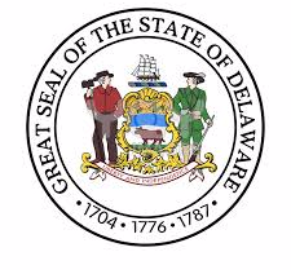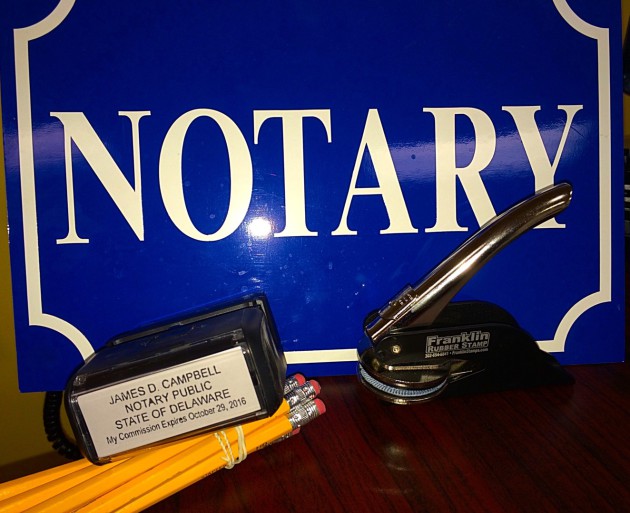
Notary I-9 Verification | Witness Swearing | Delaware Notary Public
Please call or text Delaware Notary Public Jamie Campbell directly at 302-750-9678 to arrange for:
-
completion of Section 2 of I-9 forms for new employee verification
-
companies like AstraZeneca often use 3rd-party HireRight) or other remote hiring electronic authorization service. Please provide the hiring company or 3rd-party the email address jamie@sbsbyjamie.com and reach out to Jamie to let him know.
-
paper I-9 forms can be completed with Jamie acting as Authorized Representative on behalf the hiring company
-
-
remote or in person swearing in of a witness by a Delaware notary public for depositions or other court proceedings
-
certified copies requiring attestation for apostille
Call or text Jamie directly at 302-750-9678 if you require mobile notary services.
- certified or attested copies ("a true, correct and exact copy of the original document")
- will and last testamtent
- POA (Power of Attorney)
- quitclaim deeds and mortgage documents
- mail away closings and 3rd-party settlement packages
- guardianship or conservatorship documentation for elderly or minors
- travel consent for minors
- tattoo or piercing parental consent for minors
- divorce forms and filings
- corporate documents
- real estate signings, leases and other rental agreements
- total loss affidavits for insurance companies
- financial documents and forms
- legal documents and forms
- trust documents and loan forms
- I9 forms, including remote hire (authorized employer representative)
- HireRight/AstraZeneca employees please call me directly
- USPS Form 1583
- medical licensing and vocational applications (e.g. nursing, cosmotology, massage)
- educational and FAFSA applications
- absentee voting ballots
- passport renewal applications and Issuance of Passport Statement of Consent
- concealed carry permit (CCDW) applications
- spousal consent for pensions, IRAs, 401Ks, TIAA and other bank forms
- general affidavits, attestations, acknowledgments & jurats
- oaths and affirmations
- advanced health directives (living wills) and HIPAA documents
- Bill of Sale for property or vehicle
- oath of office for notary commission
- alternative short certificate for small estates
- probate and estate documentation for the Delaware Register of Wills
- international or foreign documentation for embassies or consulates requiring a Delaware notary
- Doing Business As (DBA) name registration (Trade, Business and Fictitious Names)
- instances where a traveling notary is required
- titles, duplicate title and motor vehicle forms for Delaware, Pennsylvania, New Jersey, Maryland and other states
(click for DMV links) - Bills of Sale and Coast Guard dccuments related to watercraft (Delaware boat registration information can be found here)
If you have any questions, please reach out to Jamie directly
by texting or calling 302-750-9678 or using my contact form
Contactless and cashless payment options available.
I am a Delaware notary centrally located
between Hockessin, Newark & Wilmington.
I have been providing quick, convenient and discreet Delaware notary services in northern New Castle County since 2014 and have notarized thousands of documents and visited hundreds of mobile locations.
My notary public commission for the State of Delaware authorizes me to:
per Title 29, Part IV, Chapter 43, Subchapter 2, Section 4321 of the Delaware Code.
Acceptable Identification for Delaware Notarizations
- State issued drivers license or identification card.
- United States issued Passport
- Military identification card
- IDs and resident alien IDs or “green cards” issued by Immigration Services and the U.S. Citizenship office.
- Identification cannot be expired.
- IDs should have the following: photograph, a physical description a physical description (e.g., “brown hair, green eyes”), and a signature of the bearer.
Most government-issued IDs contain all three components.
Taking an Acknowledgement
The acknowledgement is the most common notarial act. To acknowledge means to “recognize as one’s own.” As acknowledgement enables a document to be publicly recorded (a deed, for example) or actually
proves its execution. The signer is acknowledging that the signature on the document is his or hers, and that the document was signed willingly for its stated purpose. The document will need to be
signed before the verbal ceremony takes place. The notary certifies in a notarial certificate that these actions were completed.
You usually see acknowledgements on most real estate transactions, deeds, contracts, powers of attorney, or any type of document where a person has to agree to some particular terms of the
document.
If the document is executed in a representative capacity, an acknowledgement certifies that the person who signed the document did so in behalf of and executed it as the act of the person or entity
states therein. The document requiring an acknowledgement does not have to be signed in the presence of the notary, but it must display the signer’s original, “wet-ink” signature.
Difference Between an Oath and Acknowledgement
The difference between an oath and an acknowledgement is extremely important. In an oath or affirmation, a person swears to or affirms the truthfulness of statements made. In an acknowledgement, a
person is not swearing to the truth of statements, but is confirming that a document was willingly executed and signed by him/her and that the signer understands the nature and purpose of the act. To
take an acknowledgement, the notary performs a verbal ceremony by asking the signer a question in substantially the following form:
“Do you acknowledge that this is your signature and that you understand
this document and signed it willingly for the purposes stated herein?”
The signer’s response, “Yes,” OR “I DO” completes the verbal ceremony.
Acknowledgement Certificates
In executing an acknowledgement certificate, the notary certifies that:
- The signer personally appeared before the notary on the date and at the location states.
- The signer was positively identified by the notary.
- The signer acknowledged to the notary that the signature being acknowledged was freely made for the purpose stated in the document, and, if applicable, acknowledged also that the signer had authority to sign as a representative.
- The notary verbally administered an acknowledgement to the signer, and the signer responded in the affirmative.
Samples of Documents Notarized with an Acknowledgment:
- Deeds --- Grant, Trust, Quitclaim, Warranty
- Garnishment of Wages
- Living Will
- Parental Permission Forms
- Homestead Declaration
- Patents – Signatures of Corporate Officers
- Acknowledgment of Disbursement
- Prenuptial Agreements
- Letters
- Releases – Medical, Lien, etc.
- Bid Requests
- Powers of Attorney
- Bid Bonds
- Automobile Transfers
- Change Orders
- Leases
- Security Agreement
- Certificates of Insurance
- Medical Power of Attorney
- Transfer of Funeral Plot
- Deed of Easement
- Quarter Horse Registrations
- Mechanic’s Lien
- Notary Bonds
- Cosigner Responsible for Lease
- Contracts
Administering an Oath or Affirmation
An “oath” is a is a pledge with a legal purpose made to a Supreme Being. A person who takes an oath may be prosecuted for perjury in the event of falsehood. A notary administers or gives an oath to a
person and the person takes the oath or swears to be information. When administering an oath, the notary must perform a “verbal ceremony”, that is, the notary makes a verbal statement that the
oath-taker repeats verbatim, or asks a question to which the oath-taker makes an affirmative response.
An “affirmation” is a promise of truthfulness that is a solemn, spoken pledge on one’s personal honor without reference to a Supreme Being. The Affirmation carries the same legal weight as the oath,
but omits the reference to God. Some signers may prefer this for religious or other reasons.
An oath must be given in person.
Notaries may administer any oath required by state law, including an Oath of Office or a Statement of Officer, to public officials. If preferred, the notary may ask the signer to raise his or her
right hand in a pledging gesture. Such a ceremony impresses upon the signer the solemnity of the oath taken. The best way to administer an oath or affirmation (for the execution of a document) is for
a notary to simply ask the oath-taker the question:
“Do you solemnly swear under the penalties of perjury that the statements that you are about to make will be the truth, so help you God?”
For an affirmation, the notary would ask:
“Do you solemnly affirm under the penalties of perjury that the statements that you are about to make will be the truth?”
The oath-taker must respond by saying “yes”, “I do” or “I will” if the oath is posed in the form of a question or must simply repeat the oath verbatim. If the signer is unable to speak, the signer
may nod or use some other gesture to indicate agreement or write a response. This ceremony must take place. If no oath is given, or if there is no response, the oath has not been properly
administered, possibly invalidating the transaction. Failure to administer an oath or affirmation when required constitutes grounds for revocation of the notary commission.
An affirmation is an act in which a person affirms the truthfulness of a statement or document the penalties of perjury, and is bound by his or her own conscience to tell the truth. There is no
reference to a Supreme Being in an affirmation. The wording for administering an affirmation is similar to an oath, omitting any reference to a Supreme Being. To administer an affirmation (for the
execution of a document), the notary simply asks the signer or affirmant:
……….”Do you affirm under the penalties of perjury that the information contained in this document is the truth”
Only the individual may take the oath or affirmation. A corporation, partnership, or trust may not take an oath or affirmation. The person signing on behalf of a corporation, partnership, or trust
may takes an oath or affirmation as an individual, swearing or affirming that he or she has both personal knowledge of the facts to be sworn to or affirmed and the authority to sign for the
corporation, partnership, or trust.
An oath given to a person as an Oath of Office may be spoken by the notary and repeated verbatim by the office holder.
I (name of person taking oath) do hereby swear that I will uphold the office of…..”
Taking a Verification upon Oath or Affirmation
An oath of affirmation will appear on documents in which the signer has written information or made a statement such as an application or affidavit. The document requires notarization so the signer
of the document can verify that the contents of the document are true. The notary administers a verbal ceremony for an oath or affirmation, as follows:
“Do you solemnly swear under the penalties of perjury that the information contained in this document or statement is the truth, so help you God?”
The spoken affirmation would be:
“Do you solemnly affirm under the penalties of perjury that the information contained in this document or statement is the truth?”
In order to complete the verbal ceremony and for the notarization process to proceed beyond this point, the signer must verbally respond by saying “YES” OR “I DO.” For documents requiring an
oath/affirmation, the document must be signed by the signer/oath-taker in the presence of the notary.
Witness or Attest a Signature
A notary may be asked to witness a signature on a document for which neither an oath nor an acknowledgement is required. The document creator or recipient wants a positive identification of the
person signing the document, however. The person signing this document in the presence of the notary must personally appear before the notary and sign the document in the presence of the notary. This
notarial act is intended to lessen the risk of a forged signature and add the authority of a public officer who witnesses the signing of the document. In these two (2) ways the person’s signature on
a document is given credibility. In witnessing a signature the notary certifies:
- The signer personally appeared at the time of the notarization.
- The signer was positively identified.
- The signer signed the document in the presence of the notary.
Certify or Attest a Copy
Notaries are often asked to make certified copies of documents for clients who are requested to provide certain information to individuals or public agencies. To certify means to authenticate or to
attest as being true or as
represented. These official copies provide credibility and assurance to the receiving party that information has not been altered from the original document.
How to Certify a Copy
To make a certified copy of a document, the following criteria must be met:
- The document must be an original document. You cannot make a certified copy from a photocopy or from another certified copy.
- The document cannot be a vital record or a document that is recordable in the public records within the State of Delaware.
- To ensure that the document has not been altered, the notary must make the photocopy or supervise the making of the photocopy from the original. It is not enough to simply compare a photocopy to the original document.
- The notary must complete a notarial certificate for a certified copy on the photocopy or as an attachment.
Prohibited Recordable Documents
A notary must not make certified copies of recordable documents. Recordable documents include the following:
- Deeds, mortgages, and other instruments dealing with real estate.
- Vital records including birth certificates, death certificates, marriage records, and divorce records.
- Powers of Attorney.
- Probate Wills.
- Student records or transcripts from public schools, colleges, or universities.
- Military discharges.
- Some instruments relating to personal property, such as secured transactions under the Uniform Commercial Code.
- Pleadings and other documents related to legal proceedings before courts and administrative agencies.
- Any document marked “filed” or “recorded” and most documents retained by a government office.
- Photographs (Notaries are NOT authorized to certified the authenticity of photographs. When asked to perform this service, the best alternative is to administer an oath or complete a jurat for a person making an affidavit about the identity of the person or object in the Photograph. This takes the liability off the notary and puts it on the person making the sworn statement about the photograph).
This list is not an exhaustive list of all recordable documents. If in doubt as to whether a document is recordable, you should either contact the County Clerk’s office or the government agency that issued the document, or simply refuse to make the certified copy.
Documents Eligible for Copy Certification by a Notary
A notary is generally permitted to duplicate and certify many types of documents, assuming that the previously stated criteria are met:
- Documents involving business transactions, i.e. bank loan documents. School diplomas (but not official school records or transcripts).
- Personal letters.
- A Social Security card (the Social Security Administration will certify information regarding the Social Security number, a person’s account status, and eligibility in a letter, and will issue a duplicate replacement card if the original card is lost; however, they will not certify a copy of a Social Security Card.)
- Insurance policies.
- Accounting statements.
- Contracts.
- Lease agreements.
- Invoices or bills of sale.
- Student permission forms.
- Consent to give medical treatment forms.
- Living wills.
- Consent to travel forms.
This list is not exhaustive. If there is ever a doubt as to whether a document is eligible for copy certification by a notary public and you are unable to make a determination with confidence, you should decline to perform the service.
DISCLAIMER
In accordance with Delaware Code Title 29, Chapter 43, Subchapter II, § 4336 (d) (2):
I am not an attorney licensed to practice law in this State. I am not allowed to draft legal records, give advice on legal matters, including immigration, or charge a fee for those activities.





